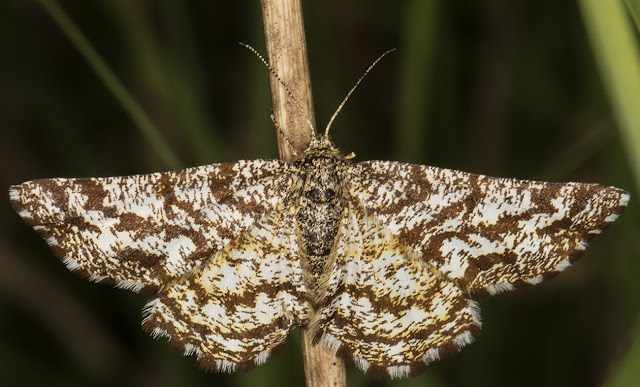 |
| Old Lodge Nature Reserve, 11 June 2016. |
A short walk in the Old Lodge Nature Reserve, part of the Ashdown Forest. This site is mostly of interest to birders, but it is a nice piece of heathland for anyone. The view above is fairly typical. It's a mixture of heather, grass and rushes, with a few small ponds on the way down the path you can see, with colourful dragonflies, and some stands of pines.
The item hung up on a post is a beater, for use in case of fire. There are a number of these beaters placed around the site, very visible and very easy to grab.
 |
| Short grass with flowers. |
At the top of the slope, where the ground is reasonably dry, the short grass actuall contains lots of small sedges and some flowering plants. These little white flowers are Heath Bedstraw, and the yellow ones are Tormentil.
 |
| Lichen, Cladonia portentosa, among low heather. Old Lodge Nature Reserve, 11 June 2016. |
But part way down the slope I found some of this lichen, Cladonia portentosa, covering the ground. This must be a particularly dry section. This lichen doesn't grow like this where there is much competition for space.
I saw lots of small brown moths flitting about, and photographed two that I thought were different species.
 |
| Common Heath, Ematurga atomaria. Female. Old Lodge Nature Reserve, 11 June 2016. |
I thought this was a Latticed Heath, but a second look shows that it is not really latticed. It's a Common Heath, a very variable species.
 |
| Common Heath, Ematurga atomaria. Male. Old Lodge Nature Reserve, 11 June 2016. |
This is the same species. The difference in appearance isn't just due to these being different genders, though the female is usually lighter than the male. It's a more general variability.
You can tell the male by its lush feathery antennae, used to detect female pheromones.
Further down the slope I started to see fewer brown moths and instead came across some whitish ones. I followed a few of these, but whenever they made a landing they dived for cover, so the best shot I was able to get was partly obstructed.
 |
| Grass Wave, Perconia strigillaria. Old Lodge Nature Reserve, 11 June 2016. |
Some people look for birds. I looked for moths ...






No comments:
Post a Comment